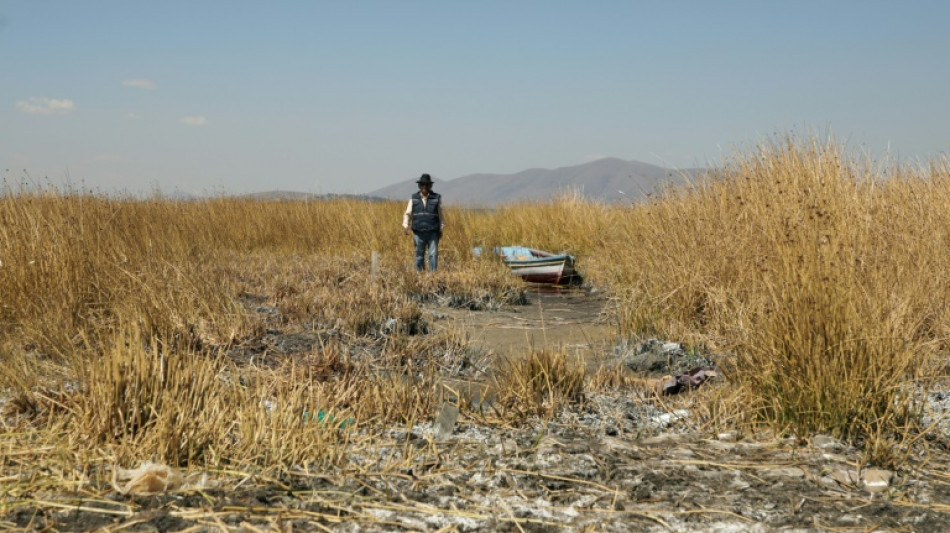
-
 Serbian minister indicted over Kushner-linked hotel plan
Serbian minister indicted over Kushner-linked hotel plan
-
Eurovision 2026 will feature 35 countries: organisers

-
 Cambodia says Thailand bombs province home to Angkor temples
Cambodia says Thailand bombs province home to Angkor temples
-
US-Ukrainian talks resume in Berlin with territorial stakes unresolved

-
 Small firms join charge to boost Europe's weapon supplies
Small firms join charge to boost Europe's weapon supplies
-
Driver behind Liverpool football parade 'horror' warned of long jail term

-
 German shipyard, rescued by the state, gets mega deal
German shipyard, rescued by the state, gets mega deal
-
Flash flood kills dozens in Morocco town

-
 'We are angry': Louvre Museum closed as workers strike
'We are angry': Louvre Museum closed as workers strike
-
Australia to toughen gun laws as it mourns deadly Bondi attack

-
 Stocks diverge ahead of central bank calls, US data
Stocks diverge ahead of central bank calls, US data
-
Wales captain Morgan to join Gloucester

-
 UK pop star Cliff Richard reveals prostate cancer treatment
UK pop star Cliff Richard reveals prostate cancer treatment
-
Mariah Carey to headline Winter Olympics opening ceremony

-
 Indonesia to revoke 22 forestry permits after deadly floods
Indonesia to revoke 22 forestry permits after deadly floods
-
Louvre Museum closed as workers strike

-
 Spain fines Airbnb 64 mn euros for posting banned properties
Spain fines Airbnb 64 mn euros for posting banned properties
-
Japan's only two pandas to be sent back to China

-
 Zelensky, US envoys to push on with Ukraine talks in Berlin
Zelensky, US envoys to push on with Ukraine talks in Berlin
-
Australia to toughen gun laws after deadly Bondi shootings

-
 Lyon poised to bounce back after surprise Brisbane omission
Lyon poised to bounce back after surprise Brisbane omission
-
Australia defends record on antisemitism after Bondi Beach attack

-
 US police probe deaths of director Rob Reiner, wife as 'apparent homicide'
US police probe deaths of director Rob Reiner, wife as 'apparent homicide'
-
'Terrified' Sydney man misidentified as Bondi shooter

-
 Cambodia says Thai air strikes hit home province of heritage temples
Cambodia says Thai air strikes hit home province of heritage temples
-
EU-Mercosur trade deal faces bumpy ride to finish line

-
 Inside the mind of Tolkien illustrator John Howe
Inside the mind of Tolkien illustrator John Howe
-
Mbeumo faces double Cameroon challenge at AFCON

-
 Tongue replaces Atkinson in only England change for third Ashes Test
Tongue replaces Atkinson in only England change for third Ashes Test
-
England's Brook vows to rein it in after 'shocking' Ashes shots

-
 Bondi Beach gunmen had possible Islamic State links, says ABC
Bondi Beach gunmen had possible Islamic State links, says ABC
-
Lakers fend off Suns fightback, Hawks edge Sixers

-
 Louvre trade unions to launch rolling strike
Louvre trade unions to launch rolling strike
-
Far-right Kast wins Chile election landslide

-
 Asian markets drop with Wall St as tech fears revive
Asian markets drop with Wall St as tech fears revive
-
North Korean leader's sister sports Chinese foldable phone

-
 Iran's women bikers take the road despite legal, social obstacles
Iran's women bikers take the road despite legal, social obstacles
-
Civilians venture home after militia seizes DR Congo town

-
 Countdown to disclosure: Epstein deadline tests US transparency
Countdown to disclosure: Epstein deadline tests US transparency
-
Desperate England looking for Ashes miracle in Adelaide

-
 Far-right Kast wins Chile election in landslide
Far-right Kast wins Chile election in landslide
-
What we know about Australia's Bondi Beach attack

-
 Witnesses tell of courage, panic in wake of Bondi Beach shootings
Witnesses tell of courage, panic in wake of Bondi Beach shootings
-
Chiefs out of playoffs after decade as Mahomes hurts knee

-
 Chilean hard right victory stirs memories of dictatorship
Chilean hard right victory stirs memories of dictatorship
-
Volunteers patrol Thai villages as artillery rains at Cambodia border

-
 Applied Energetics Completes First Outdoor Testing of Ultrashort Pulse Laser System
Applied Energetics Completes First Outdoor Testing of Ultrashort Pulse Laser System
-
Historic Z3 Metaverse White Paper

-
 Greenlane Announces Results of Annual Meeting of Stockholders, Canopy Growth Co Founder Bruce Linton Joins Greenlane's Board of Directors
Greenlane Announces Results of Annual Meeting of Stockholders, Canopy Growth Co Founder Bruce Linton Joins Greenlane's Board of Directors
-
Stillwater Critical Minerals Announces Bought Deal LIFE Private Placement for Gross Proceeds of C$10 Million


High in the Andes, Lake Titicaca's water levels fall to historic lows
Pedro de la Cruz stands beside his stranded boat and supplicates his God, lifting his arms and praying anxiously for rain to replenish Lake Titicaca, the massive body of water at a breath-sapping altitude in the Andes on the border between Bolivia and Peru.
"Dear God, make more rain come," the 74-year-old says, invoking Pachamama, Mother Earth for Indigenous people of the region. "Help us, please, we are parched here.... Make the rain showers come... Father in heaven, have pity."
De la Cruz, a former state employee, spoke in Aymara, his native language, as he surveyed what was once the shore of Lake Titicaca, some 45 miles (77 kilometers) west of the capital La Paz.
The waters of Lake Titicaca are within 10 inches (25 centimeters) of their all-time low, a record set in 1996, the chief forecaster for Bolivia's weather service (Senhami), Lucia Walper, tells AFP.
Along what was once the 700-mile shoreline of the lake, one now sees boats stranded on dry land and orphan docks stretched over nonexistent water.
Low levels mean that fish that ordinarily spawn near shore are now unable to, and that leads Edwin Katari, a 43-year-old fisherman, to mull a question.
"So where are the fish going to spawn?" Katari asks.
- Dark forecast –
Bolivia's Senhami has measured water levels of the lake since 1974.
At its highest point in 1986, water levels reached 12 feet higher than they are today, topping out at 12,504.2 feet (3,811 meters) above sea level. But in 1996, they had fallen to 12,491.4 feet above sea level.
Walper says falling water levels are "the result of climate change" and the outlook is not good.
"It is very probable that they keep falling until they hit even lower levels," she says.
A satellite survey still has not been made to see how much Lake Titicaca, which once had a surface area of 3,200 square miles (8,300 square kilometers), has shrunk.
It is the highest of the world's large lakes and is one of the largest in South America, after Venezuela's Lake Maracaibo (which is actually connected to the Caribbean Sea) and Brazil's Lagoa dos Patos, a coastal lagoon.
- La Nina and El Nino –
The level of Lake Titicaca "has been progressively decreasing due to many meteorological, hydrological and climatic factors," explains Walper, who emphasizes that "there is less rainfall."
"Over the years, each phenomenon, whether El Nino and/or La Nina, has been presenting a distortion in its parameters and factors," she points out, explaining the characteristics of these events -- associated with rains or droughts -- over time.
The rainfall and the inflow to the lake from Peruvian rivers "were not sufficient to generate the normal rises in times of rain," she says.
El Nino is a natural climatic event, generally associated with increased temperatures, drought in some parts of the world, and heavy rains in others. La Nina, on the other hand, causes the opposite effects, particularly a drop in temperatures.
Other stresses impact the lake. It is heavily polluted by waste from the city of El Alto, a metropolis of one million people in this landlocked country. Additionally, indiscriminate fishing has decimated species.
- Despair sets in –
Because the decline in water levels is linked to climate change, the solution "is a global issue," Walper adds.
The recent summit in Brazil of the Amazon Cooperation Treaty Organization (ACTO) reaffirmed the call for industrialized countries to fulfill their promises of economic resources to finance actions against climate change.
But in the villages around Lake Titicaca, despair has set in that water levels will never return to normal in the world's highest navigable sea.
"If there is no water, if there is no rain, we will not be able to live," frets De la Cruz.
G.Stevens--AMWN


